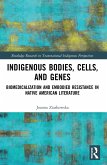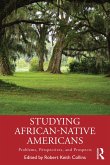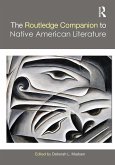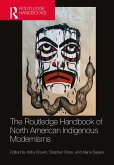Joanna Ziarkowska
Indigenous Bodies, Cells, and Genes
Biomedicalization and Embodied Resistance in Native American Literature
Joanna Ziarkowska
Indigenous Bodies, Cells, and Genes
Biomedicalization and Embodied Resistance in Native American Literature
- Gebundenes Buch
- Merkliste
- Auf die Merkliste
- Bewerten Bewerten
- Teilen
- Produkt teilen
- Produkterinnerung
- Produkterinnerung
This book explores Native American literary responses to biomedical discourses and biomedicalization processes as they circulate in social and cultural contexts. It will appeal to scholars of Native American and Indigenous Studies, as well as to others with an interest in literature and medicine.
Andere Kunden interessierten sich auch für
![Indigenous Bodies, Cells, and Genes Indigenous Bodies, Cells, and Genes]() Joanna ZiarkowskaIndigenous Bodies, Cells, and Genes42,99 €
Joanna ZiarkowskaIndigenous Bodies, Cells, and Genes42,99 €![Studying African-Native Americans Studying African-Native Americans]() Studying African-Native Americans35,99 €
Studying African-Native Americans35,99 €![The Routledge Companion to Native American Literature The Routledge Companion to Native American Literature]() The Routledge Companion to Native American Literature47,99 €
The Routledge Companion to Native American Literature47,99 €![The Routledge Handbook of North American Indigenous Modernisms The Routledge Handbook of North American Indigenous Modernisms]() The Routledge Handbook of North American Indigenous Modernisms242,99 €
The Routledge Handbook of North American Indigenous Modernisms242,99 €![Urgent Archives Urgent Archives]() Michelle Caswell (USA UCLA)Urgent Archives55,99 €
Michelle Caswell (USA UCLA)Urgent Archives55,99 €![Trauma Texts Trauma Texts]() Trauma Texts63,99 €
Trauma Texts63,99 €![Transforming Residential Interventions Transforming Residential Interventions]() Transforming Residential Interventions54,99 €
Transforming Residential Interventions54,99 €-
-
-
This book explores Native American literary responses to biomedical discourses and biomedicalization processes as they circulate in social and cultural contexts. It will appeal to scholars of Native American and Indigenous Studies, as well as to others with an interest in literature and medicine.
Hinweis: Dieser Artikel kann nur an eine deutsche Lieferadresse ausgeliefert werden.
Hinweis: Dieser Artikel kann nur an eine deutsche Lieferadresse ausgeliefert werden.
Produktdetails
- Produktdetails
- Routledge Research in Transnational Indigenous Perspectives
- Verlag: Taylor & Francis Ltd
- Seitenzahl: 280
- Erscheinungstermin: 9. Oktober 2020
- Englisch
- Abmessung: 240mm x 161mm x 20mm
- Gewicht: 562g
- ISBN-13: 9780367478520
- ISBN-10: 0367478528
- Artikelnr.: 59999094
- Herstellerkennzeichnung
- Libri GmbH
- Europaallee 1
- 36244 Bad Hersfeld
- gpsr@libri.de
- Routledge Research in Transnational Indigenous Perspectives
- Verlag: Taylor & Francis Ltd
- Seitenzahl: 280
- Erscheinungstermin: 9. Oktober 2020
- Englisch
- Abmessung: 240mm x 161mm x 20mm
- Gewicht: 562g
- ISBN-13: 9780367478520
- ISBN-10: 0367478528
- Artikelnr.: 59999094
- Herstellerkennzeichnung
- Libri GmbH
- Europaallee 1
- 36244 Bad Hersfeld
- gpsr@libri.de
Joanna Ziarkowska is a Native American Studies scholar at the Institute of English Studies, University of Warsaw, Poland, where she teaches courses devoted to Native American literature, Literature and Medicine, and Film Studies.
Introduction - Indigenizing biomedicalization: community, relationality,
and embodied resistance in Native American literature
Part I: TUBERCULOSIS
Chapter 1: Virgin soil theory, boarding schools, and medical
experimentation: a history of tuberculosis among Native Americans
Chapter 2: Tuberculosis, biopower, and embodied resistance in Madonna Swan:
A Lakota Woman's Story, as told through Mark S. Pierre and Louise Erdrich's
LaRose
Part II: DIABETES
Chapter 3: Developing Indigenous models of diabetes: from genetic fatalism
to community-based approaches
Chapter 4: Beyond the biomedical model of diabetes: settler colonialism,
traditional foodways, and historical trauma in Sherman Alexie's selected
works and LeAnne Howe's Miko Kings: An Indian Baseball Story
Part III: BLOOD AND GENES
Chapter 5: From blood memory to genetic memory, and the emergence of Native
American DNA: a story of biocolonialism at the turn of the millennium
Chapter 6: "We remember our ancestors and their lives deep in our bodily
cells": mapping history in space and genes in Linda Hogan's
autobiographical writing
Part IV: INDIGENIZING BIOMEDICALIZATION
Chapter 7: The traffic of cells and ideas: Heid E. Erdrich's
biotechnological poetry
Chapter 8: Biomedical psychiatry, Native American identity, and the
politics of visibility in Elissa Washuta's My Body Is a Book of Rules
Coda
and embodied resistance in Native American literature
Part I: TUBERCULOSIS
Chapter 1: Virgin soil theory, boarding schools, and medical
experimentation: a history of tuberculosis among Native Americans
Chapter 2: Tuberculosis, biopower, and embodied resistance in Madonna Swan:
A Lakota Woman's Story, as told through Mark S. Pierre and Louise Erdrich's
LaRose
Part II: DIABETES
Chapter 3: Developing Indigenous models of diabetes: from genetic fatalism
to community-based approaches
Chapter 4: Beyond the biomedical model of diabetes: settler colonialism,
traditional foodways, and historical trauma in Sherman Alexie's selected
works and LeAnne Howe's Miko Kings: An Indian Baseball Story
Part III: BLOOD AND GENES
Chapter 5: From blood memory to genetic memory, and the emergence of Native
American DNA: a story of biocolonialism at the turn of the millennium
Chapter 6: "We remember our ancestors and their lives deep in our bodily
cells": mapping history in space and genes in Linda Hogan's
autobiographical writing
Part IV: INDIGENIZING BIOMEDICALIZATION
Chapter 7: The traffic of cells and ideas: Heid E. Erdrich's
biotechnological poetry
Chapter 8: Biomedical psychiatry, Native American identity, and the
politics of visibility in Elissa Washuta's My Body Is a Book of Rules
Coda
Introduction - Indigenizing biomedicalization: community, relationality, and embodied resistance in Native American literature
Part I: TUBERCULOSIS
Chapter 1: Virgin soil theory, boarding schools, and medical experimentation: a history of tuberculosis among Native Americans
Chapter 2: Tuberculosis, biopower, and embodied resistance in Madonna Swan: A Lakota Woman's Story, as told through Mark S. Pierre and Louise Erdrich's LaRose
Part II: DIABETES
Chapter 3: Developing Indigenous models of diabetes: from genetic fatalism to community-based approaches
Chapter 4: Beyond the biomedical model of diabetes: settler colonialism, traditional foodways, and historical trauma in Sherman Alexie's selected works and LeAnne Howe's Miko Kings: An Indian Baseball Story
Part III: BLOOD AND GENES
Chapter 5: From blood memory to genetic memory, and the emergence of Native American DNA: a story of biocolonialism at the turn of the millennium
Chapter 6: "We remember our ancestors and their lives deep in our bodily cells": mapping history in space and genes in Linda Hogan's autobiographical writing
Part IV: INDIGENIZING BIOMEDICALIZATION
Chapter 7: The traffic of cells and ideas: Heid E. Erdrich's biotechnological poetry
Chapter 8: Biomedical psychiatry, Native American identity, and the politics of visibility in Elissa Washuta's My Body Is a Book of Rules
Coda
Part I: TUBERCULOSIS
Chapter 1: Virgin soil theory, boarding schools, and medical experimentation: a history of tuberculosis among Native Americans
Chapter 2: Tuberculosis, biopower, and embodied resistance in Madonna Swan: A Lakota Woman's Story, as told through Mark S. Pierre and Louise Erdrich's LaRose
Part II: DIABETES
Chapter 3: Developing Indigenous models of diabetes: from genetic fatalism to community-based approaches
Chapter 4: Beyond the biomedical model of diabetes: settler colonialism, traditional foodways, and historical trauma in Sherman Alexie's selected works and LeAnne Howe's Miko Kings: An Indian Baseball Story
Part III: BLOOD AND GENES
Chapter 5: From blood memory to genetic memory, and the emergence of Native American DNA: a story of biocolonialism at the turn of the millennium
Chapter 6: "We remember our ancestors and their lives deep in our bodily cells": mapping history in space and genes in Linda Hogan's autobiographical writing
Part IV: INDIGENIZING BIOMEDICALIZATION
Chapter 7: The traffic of cells and ideas: Heid E. Erdrich's biotechnological poetry
Chapter 8: Biomedical psychiatry, Native American identity, and the politics of visibility in Elissa Washuta's My Body Is a Book of Rules
Coda
Introduction - Indigenizing biomedicalization: community, relationality,
and embodied resistance in Native American literature
Part I: TUBERCULOSIS
Chapter 1: Virgin soil theory, boarding schools, and medical
experimentation: a history of tuberculosis among Native Americans
Chapter 2: Tuberculosis, biopower, and embodied resistance in Madonna Swan:
A Lakota Woman's Story, as told through Mark S. Pierre and Louise Erdrich's
LaRose
Part II: DIABETES
Chapter 3: Developing Indigenous models of diabetes: from genetic fatalism
to community-based approaches
Chapter 4: Beyond the biomedical model of diabetes: settler colonialism,
traditional foodways, and historical trauma in Sherman Alexie's selected
works and LeAnne Howe's Miko Kings: An Indian Baseball Story
Part III: BLOOD AND GENES
Chapter 5: From blood memory to genetic memory, and the emergence of Native
American DNA: a story of biocolonialism at the turn of the millennium
Chapter 6: "We remember our ancestors and their lives deep in our bodily
cells": mapping history in space and genes in Linda Hogan's
autobiographical writing
Part IV: INDIGENIZING BIOMEDICALIZATION
Chapter 7: The traffic of cells and ideas: Heid E. Erdrich's
biotechnological poetry
Chapter 8: Biomedical psychiatry, Native American identity, and the
politics of visibility in Elissa Washuta's My Body Is a Book of Rules
Coda
and embodied resistance in Native American literature
Part I: TUBERCULOSIS
Chapter 1: Virgin soil theory, boarding schools, and medical
experimentation: a history of tuberculosis among Native Americans
Chapter 2: Tuberculosis, biopower, and embodied resistance in Madonna Swan:
A Lakota Woman's Story, as told through Mark S. Pierre and Louise Erdrich's
LaRose
Part II: DIABETES
Chapter 3: Developing Indigenous models of diabetes: from genetic fatalism
to community-based approaches
Chapter 4: Beyond the biomedical model of diabetes: settler colonialism,
traditional foodways, and historical trauma in Sherman Alexie's selected
works and LeAnne Howe's Miko Kings: An Indian Baseball Story
Part III: BLOOD AND GENES
Chapter 5: From blood memory to genetic memory, and the emergence of Native
American DNA: a story of biocolonialism at the turn of the millennium
Chapter 6: "We remember our ancestors and their lives deep in our bodily
cells": mapping history in space and genes in Linda Hogan's
autobiographical writing
Part IV: INDIGENIZING BIOMEDICALIZATION
Chapter 7: The traffic of cells and ideas: Heid E. Erdrich's
biotechnological poetry
Chapter 8: Biomedical psychiatry, Native American identity, and the
politics of visibility in Elissa Washuta's My Body Is a Book of Rules
Coda
Introduction - Indigenizing biomedicalization: community, relationality, and embodied resistance in Native American literature
Part I: TUBERCULOSIS
Chapter 1: Virgin soil theory, boarding schools, and medical experimentation: a history of tuberculosis among Native Americans
Chapter 2: Tuberculosis, biopower, and embodied resistance in Madonna Swan: A Lakota Woman's Story, as told through Mark S. Pierre and Louise Erdrich's LaRose
Part II: DIABETES
Chapter 3: Developing Indigenous models of diabetes: from genetic fatalism to community-based approaches
Chapter 4: Beyond the biomedical model of diabetes: settler colonialism, traditional foodways, and historical trauma in Sherman Alexie's selected works and LeAnne Howe's Miko Kings: An Indian Baseball Story
Part III: BLOOD AND GENES
Chapter 5: From blood memory to genetic memory, and the emergence of Native American DNA: a story of biocolonialism at the turn of the millennium
Chapter 6: "We remember our ancestors and their lives deep in our bodily cells": mapping history in space and genes in Linda Hogan's autobiographical writing
Part IV: INDIGENIZING BIOMEDICALIZATION
Chapter 7: The traffic of cells and ideas: Heid E. Erdrich's biotechnological poetry
Chapter 8: Biomedical psychiatry, Native American identity, and the politics of visibility in Elissa Washuta's My Body Is a Book of Rules
Coda
Part I: TUBERCULOSIS
Chapter 1: Virgin soil theory, boarding schools, and medical experimentation: a history of tuberculosis among Native Americans
Chapter 2: Tuberculosis, biopower, and embodied resistance in Madonna Swan: A Lakota Woman's Story, as told through Mark S. Pierre and Louise Erdrich's LaRose
Part II: DIABETES
Chapter 3: Developing Indigenous models of diabetes: from genetic fatalism to community-based approaches
Chapter 4: Beyond the biomedical model of diabetes: settler colonialism, traditional foodways, and historical trauma in Sherman Alexie's selected works and LeAnne Howe's Miko Kings: An Indian Baseball Story
Part III: BLOOD AND GENES
Chapter 5: From blood memory to genetic memory, and the emergence of Native American DNA: a story of biocolonialism at the turn of the millennium
Chapter 6: "We remember our ancestors and their lives deep in our bodily cells": mapping history in space and genes in Linda Hogan's autobiographical writing
Part IV: INDIGENIZING BIOMEDICALIZATION
Chapter 7: The traffic of cells and ideas: Heid E. Erdrich's biotechnological poetry
Chapter 8: Biomedical psychiatry, Native American identity, and the politics of visibility in Elissa Washuta's My Body Is a Book of Rules
Coda









